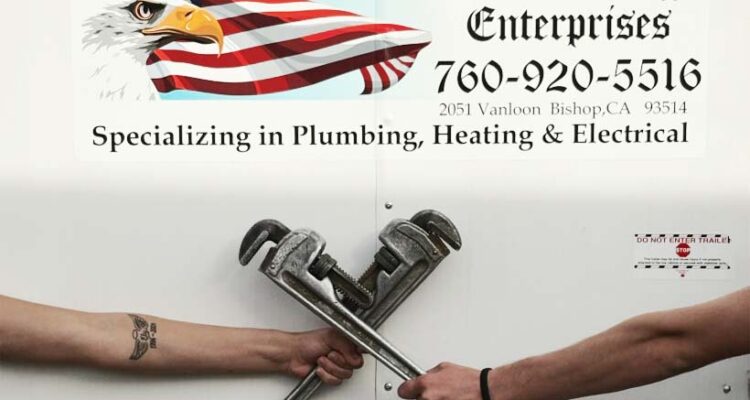Russ Aldridge talks about “seeing the needs of the people”
By Christina Reed
The Hired Pen
Eastern Sierra, CA—What are the “trades”? Who are the “tradesmen,” “craftsmen” or “tradespeople”? Russ Aldridge, a licensed tradesman in plumbing, heating, and construction, explains his thoughts on what it means to be a highly skilled worker with expertise in specific trades (such as plumbing and carpentry). Aldridge, a long-time resident of California’s eastern Sierra, is changing it up in his approach to the business, and he’s bringing his grandkids along for the future of the family’s business. As a tradesman himself, he’s offering his expertise and technical advice, and as a savvy-to-the-trades’ grandfather, he’s taking the grandsons out, for hands-on training.
“As the years go by, technology changes,” Aldridge acknowledges, and he’s training family members for years of conversions in construction, including “different materials coming on the scene.” The underpinnings of the plumbing world have transitioned, Aldridge notes, from “cast iron, from the 1930s-1960s,” to plastic. “I watched it evolve,” he adds, and life got “lighter” (materials’ weight). “In 20-30 years, it will be different” for his grandchildren. Aldridge draws these technological connections to “new furnaces” and “circuit board” electronics, and these working business elements don’t even begin to describe how tradespeople are affected by the weather, in the various regions of California.
“Seeing the needs of the people”
“Plumbing,” says Aldridge, “is like night and day difference.” Southern California doesn’t have a “frostline” and the water mains don’t have to be buried so deep, and protecting plumbing during winter is just not comparable. Knowing the weather variables is just one of the many things to figure out, notes Aldridge, as well as “dealing with inspectors,” and “doing quality-based” work.
The list of the trades is vast. There are heavy equipment operators, plumbers, mechanics, roofers, tailors (sewing), painters, carpenters, electricians, drafters (CAD work), bakers, and chefs. The trades offer apprenticeships (paid on-the-job training), and these training opportunities, in local communities, offer young people a better-than-average chance of learning skill sets they can apply universally in life. There are all of the tools you have to buy, and the trades involve bookkeeping, business management, drawing up plans if needed for permits, and Aldridge notes, above all else, “seeing the needs of the people.” CAR 2:2025







¡Enhorabuena!